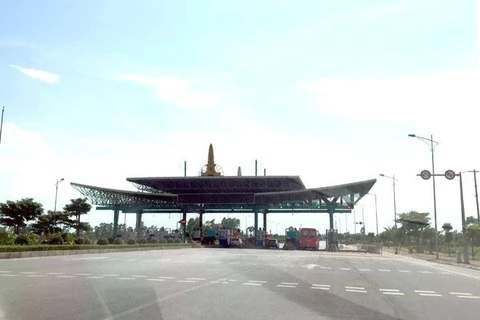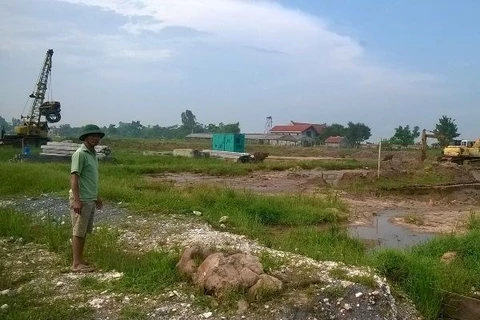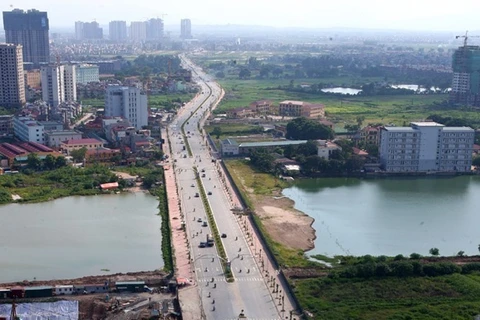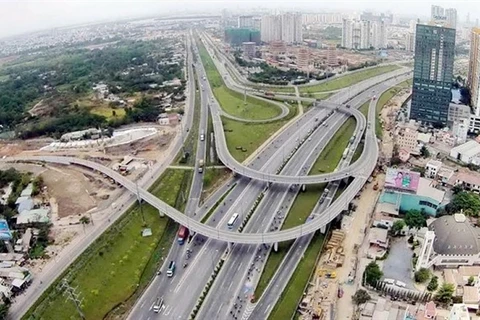 Auditors and land management experts are sceptical about the efficiency and transparency of projects carried out under BT contracts in Vietnam, after many BT projects have suffered long delays and major problems along the way (Photo: baodauthau.vn)
Auditors and land management experts are sceptical about the efficiency and transparency of projects carried out under BT contracts in Vietnam, after many BT projects have suffered long delays and major problems along the way (Photo: baodauthau.vn) Hanoi (VNS/VNA) - Auditors and land management experts are sceptical about the efficiency and transparency of projects carried out under Build-Transfer (BT) contracts in Vietnam, after many BT projects have suffered long delays and major problems along the way.
“BT” refers to the practice of exchanging land to investors who pledge to build infrastructure. The projects were introduced to Vietnam in the early 1990s when localities across the country severely lack funds for developing infrastructure.
According to Ho Duc Phoc, Auditor General of the State Audit Office of Vietnam (SAV), investment projects in the form of BT contracts increased sharply in an effort to reduce the budget deficit and public debt. However, he said, BT projects are easily abused by investors seeking to make huge profits and occupy land at a low cost.
Phoc blame this on the process for appointing contractors and a lack of transparency in the implementation of BT projects.
Many investors are weak in both financial and professional capacity and lack management experience, leading to cost overruns and project delays, he said.
Nguyen Dinh Hoa, Deputy Director of the Auditing Training Institute, said that with the BT projects, losses during the project implementation were compounded because the infrastructure provided by the BT project offers no competition and does not reflect the market price of the land ceded to investors.
Truong Hai Yen of SAV’s General Affairs Department said a recent audit of 21 BT projects found many shortcomings in the implementation of the projects.
The unclear regulations on the time of land transfer has proven problematic, leading to most of contractors receiving land before finishing construction, she said.
“The price of land at the time of transfer was usually much lower than the price at the time when construction on the project was completed, which resulted in losses for State budget,” she said.
The land prices in BT contracts are usually lower than market prices as they are negotiated between just two parties, rather than through bidding, she said.
She also said the audit of 21 BT projects found they had violated legal regulations, causing over 3.8 trillion VND (167 million USD) in financial loss to the State.
Pham Quang Tu from Oxfam Vietnam pointed out that there are many loopholes in regulations on BT projects.
For example, Item 3, Article 155 of Vietnam’s Land Law 2013 states that the State allocates land to investors to develop projects. However, there isn’t any regulation specifying what kind of land may be allocated or how its value should be determined.
Le Huy Trong, an auditing expert, said investors have taken advantage of inadequate legal framework to earn more profits.
“BT projects are developed by private investors without effective supervision and management of government agencies,” she said.
According to experts, in order to increase the transparency in BT project implementation, it is necessary to review the regulations allowing investors to propose and formulate investment projects. Current rules give investors too much influence, increasing the risk of losses for the State.
Dang Hung Vo, former Deputy Minister of Natural Resources and Environment, said that BT projects should be stopped altogether in developed areas. To increase transparency in investment projects, BT projects should only be allowed in some localities with weak budgets and a lack of infrastructure.
The main disadvantage of BT projects is the depletion of land resources, he said. Thus, it was necessary to develop a mechanism for determining the value of infrastructure works and the value of land paid to investors.
Moreover, all public-private partnership projects must be fully publicised and put under the supervision of local people, and relevant state agencies must fulfill their obligation to explain issues raised by the people.
Dang Van Thanh, Chairman of the Vietnam Association of Accountants and Auditors, said regulations on BT projects should be improved, adding that inspections on the BT projects must be strengthened during the approval and implementation phases of the projects.
Echoing Thanh’s suggestion, Tu said the completion of a legal framework on BT projects under the auspices of the Public Investment Law 2014 or Law on Public Asset Management and Usage was a must.
He also called for better law enforcement and tightened inspections, particularly on decisions by State agencies to grant licences for BT projects.
Meanwhile, Trong said it was necessary to put up land for auction so that potential BT investors must bid on the opportunity. Land value accounts for less than 50 per cent of BT projects’ investment, and the remaining capital comes from the State budget or Government bonds, he explained.-VNA
The land prices in BT contracts are usually lower than market prices as they are negotiated between just two parties, rather than through bidding, she said.
She also said the audit of 21 BT projects found they had violated legal regulations, causing over 3.8 trillion VND (167 million USD) in financial loss to the State.
Pham Quang Tu from Oxfam Vietnam pointed out that there are many loopholes in regulations on BT projects.
For example, Item 3, Article 155 of Vietnam’s Land Law 2013 states that the State allocates land to investors to develop projects. However, there isn’t any regulation specifying what kind of land may be allocated or how its value should be determined.
Le Huy Trong, an auditing expert, said investors have taken advantage of inadequate legal framework to earn more profits.
“BT projects are developed by private investors without effective supervision and management of government agencies,” she said.
According to experts, in order to increase the transparency in BT project implementation, it is necessary to review the regulations allowing investors to propose and formulate investment projects. Current rules give investors too much influence, increasing the risk of losses for the State.
Dang Hung Vo, former Deputy Minister of Natural Resources and Environment, said that BT projects should be stopped altogether in developed areas. To increase transparency in investment projects, BT projects should only be allowed in some localities with weak budgets and a lack of infrastructure.
The main disadvantage of BT projects is the depletion of land resources, he said. Thus, it was necessary to develop a mechanism for determining the value of infrastructure works and the value of land paid to investors.
Moreover, all public-private partnership projects must be fully publicised and put under the supervision of local people, and relevant state agencies must fulfill their obligation to explain issues raised by the people.
Dang Van Thanh, Chairman of the Vietnam Association of Accountants and Auditors, said regulations on BT projects should be improved, adding that inspections on the BT projects must be strengthened during the approval and implementation phases of the projects.
Echoing Thanh’s suggestion, Tu said the completion of a legal framework on BT projects under the auspices of the Public Investment Law 2014 or Law on Public Asset Management and Usage was a must.
He also called for better law enforcement and tightened inspections, particularly on decisions by State agencies to grant licences for BT projects.
Meanwhile, Trong said it was necessary to put up land for auction so that potential BT investors must bid on the opportunity. Land value accounts for less than 50 per cent of BT projects’ investment, and the remaining capital comes from the State budget or Government bonds, he explained.-VNA
VNA
























